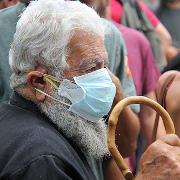
Greece (MNN) — Greece's Parliament passed austerity measures which are opposed by more
than 70% of the population.
Days of rioting preceded the votes last week, but they were
necessary to unlock bailout funds that would keep the country from
bankruptcy.
The Greek debt crisis threatens the European Union and could
still trigger a global financial meltdown equal to the U.S. collapse of Lehman
Brothers in 2008.
The impact of socialized medicine has hit AMG International
hard. St. Luke's Hospital in
Thessalonica wasn't getting payments from either insurance companies or the
government. A cash flow crunch turned
into a crush as the months went by.
Soon, the issue was threatening whether or not the hospital
could stay open. Then in March, a law
passed allowing groups like St. Luke's to use some of its tax credits against
the debt owed by the government. Coupled with its own salary cutbacks, Jenks says their ministry
now has a little breathing room. "What this will do is give us a stronger
position as we negotiate with our lines of credit and other things with the
local banks there."
In fact, St. Luke's management of the crisis has been its
own testament to biblical fiscal policy. As a result, "We're having more and more patients come as outpatients to
St. Luke's because the other hospitals are handling the situation less successfully."
Greece has not typically been a country open to overt
evangelism. Some of that is a
misconception of what the body of Christ really is. Jenks explains, "The Greek priests are
considered government employees in
Greece. Their salaries are paid as part of the government payroll." Since the austerity measures would hit them
hard, "Some of the protestors out on the
streets are Greek priests because they don't want to lose their benefit with
the government."
Given the close association of the Orthodox Church with the
government, he says that can make work for Christ-followers a little more
difficult. "I think many times, the church is looked at as an extension of the
public sector. So, there's no real need for the people to have a personal responsibility. As a result, their
faith is nominal in many cases."
It's a unique position to be in. Under the current circumstances, the Biblical
fiscal policies of the local evangelical body is what keeps it running. "Those in the evangelical churches, the
pastors, are supported by the congregation. So, people give even out of sacrifice. Especially in this time of economic hardship, that is even a greater burden
to bear."
And what the church does with their resources has attracted
attention. Many refugees fleeing
the "Arab Spring" have gone to Europe hoping to capitalize on the Schengen
Agreement. However, open borders across the Eurozone have begun
tightening restrictions, trapping many between a country at war and a country
that doesn't want to or can't afford to help.
But Jenks says
here again, this is where believers stand out, separating the Body of Christ from the
secular function of government. "I think it's an opportunity for the
evangelical community in Greece to stand up and be counted as they give aid to
all of these international refugees, the illegal immigrants. The community is
doing a wonderful job in giving the aid and love that Christ alone can
provide."
The reprieve has bought Greece some time to get its affairs
in order. In September, it will have to
prove that the cuts have been implemented in order to receive any further help from
its bailout package.
Keep praying.

